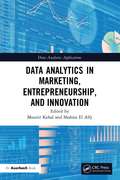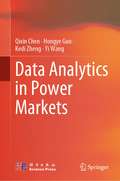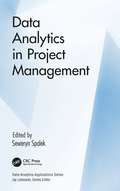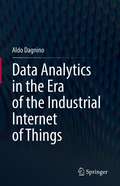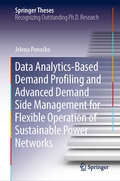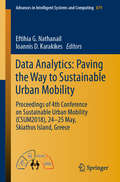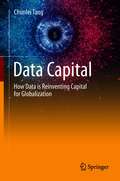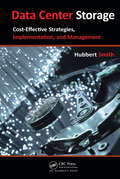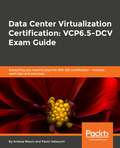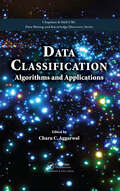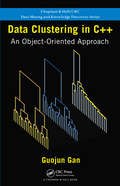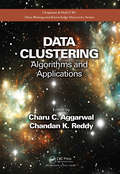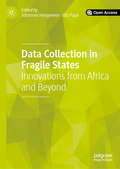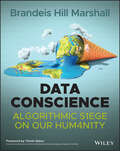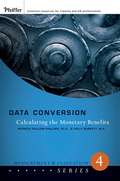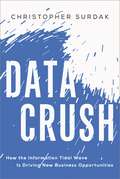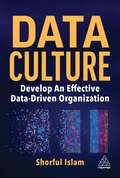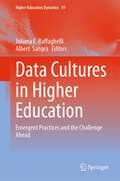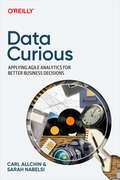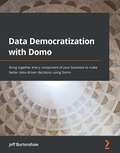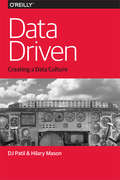- Table View
- List View
Data Analytics in Marketing, Entrepreneurship, and Innovation (Data Analytics Applications)
by Mounir Kehal Shahira El AlfyInnovation based in data analytics is a contemporary approach to developing empirically supported advances that encourage entrepreneurial activity inspired by novel marketing inferences. Data Analytics in Marketing, Entrepreneurship, and Innovation covers techniques, processes, models, tools, and practices for creating business opportunities through data analytics. It features case studies that provide realistic examples of applications. This multifaceted examination of data analytics looks at: Business analytics Applying predictive analytics Using discrete choice analysis for decision-making Marketing and customer analytics Developing new products Technopreneurship Disruptive versus incremental innovation The book gives researchers and practitioners insight into how data analytics is used in the areas of innovation, entrepreneurship, and marketing. Innovation analytics helps identify opportunities to develop new products and services, and improve existing methods of product manufacturing and service delivery. Entrepreneurial analytics facilitates the transformation of innovative ideas into strategy and helps entrepreneurs make critical decisions based on data-driven techniques. Marketing analytics is used in collecting, managing, assessing, and analyzing marketing data to predict trends, investigate customer preferences, and launch campaigns.
Data Analytics in Power Markets
by Yi Wang Qixin Chen Hongye Guo Kedi ZhengThis book aims to solve some key problems in the decision and optimization procedure for power market organizers and participants in data-driven approaches. It begins with an overview of the power market data and analyzes on their characteristics and importance for market clearing. Then, the first part of the book discusses the essential problem of bus load forecasting from the perspective of market organizers. The related works include load uncertainty modeling, bus load bad data correction, and monthly load forecasting. The following part of the book answers how much information can be obtained from public data in locational marginal price (LMP)-based markets. It introduces topics such as congestion identification, componential price forecasting, quantifying the impact of forecasting error, and financial transmission right investment. The final part of the book answers how to model the complex market bidding behaviors. Specific works include pattern extraction, aggregated supply curve forecasting, market simulation, and reward function identification in bidding. These methods are especially useful for market organizers to understand the bidding behaviors of market participants and make essential policies. It will benefit and inspire researchers, graduate students, and engineers in the related fields.
Data Analytics in Project Management (Data Analytics Applications)
by Seweryn SpalekThis book aims to help the reader better understand the importance of data analysis in project management. Moreover, it provides guidance by showing tools, methods, techniques and lessons learned on how to better utilize the data gathered from the projects. First and foremost, insight into the bridge between data analytics and project management aids practitioners looking for ways to maximize the practical value of data procured. The book equips organizations with the know-how necessary to adapt to a changing workplace dynamic through key lessons learned from past ventures. The book’s integrated approach to investigating both fields enhances the value of research findings.
Data Analytics in the Era of the Industrial Internet of Things
by Aldo DagninoThis book presents the characteristics and benefits industrial organizations can reap from the Industrial Internet of Things (IIoT). These characteristics and benefits include enhanced competitiveness, increased proactive decision-making, improved creativity and innovation, augmented job creation, heightened agility to respond to continuously changing challenges, and intensified data-driven decision making. In a straightforward fashion, the book also helps readers understand complex concepts that are core to IIoT enterprises, such as Big Data, analytic architecture platforms, machine learning (ML) and data science algorithms, and the power of visualization to enrich the domains experts’ decision making. The book also guides the reader on how to think about ways to define new business paradigms that the IIoT facilitates, as well how to increase the probability of success in managing analytic projects that are the core engine of decision-making in the IIoT enterprise. The book starts by defining an IIoT enterprise and the framework used to efficiently operate. A description of the concepts of industrial analytics, which is a major engine for decision making in the IIoT enterprise, is provided. It then discusses how data and machine learning (ML) play an important role in increasing the competitiveness of industrial enterprises that operate using the IIoT technology and business concepts. Real world examples of data driven IIoT enterprises and various business models are presented and a discussion on how the use of ML and data science help address complex decision-making problems and generate new job opportunities. The book presents in an easy-to-understand manner how ML algorithms work and operate on data generated in the IIoT enterprise. Useful for any industry professional interested in advanced industrial software applications, including business managers and professionals interested in how data analytics can help industries and to develop innovative business solutions, as well as data and computer scientists who wish to bridge the analytics and computer science fields with the industrial world, and project managers interested in managing advanced analytic projects.
Data Analytics-Based Demand Profiling and Advanced Demand Side Management for Flexible Operation of Sustainable Power Networks (Springer Theses)
by Jelena PonoćkoThis thesis deals with two important and very timely aspects of the future power system operation - assessment of demand flexibility and advanced demand side management (DSM) facilitating flexible and secure operation of the power network. It provides a clear and comprehensive literature review in these two areas and states precisely the original contributions of the research. The book first demonstrates the benefits of data mining for a reliable assessment of demand flexibility and its composition even with very limited observability of the end-users. It then illustrates the importance of accurate load modelling for efficient application of DSM and considers different criteria in designing DSM programme to achieve several objectives of the network performance simultaneously. Finally, it demonstrates the importance of considering realistic assumptions when planning and estimating the success of DSM programs.The findings presented here have both scientific and practical significance; they gained her BSc and MSc degrees in electrical engineering from the University of Belgrade in 2011 and 2012 respectively. She graduated with her PhD from the University of Manchester. She has presented at several conferences, and has won runner-up prizes in poster presentation at three. She has authored or co-authored more than 40 journal, conference and technical papers.provide a basis for further research, and can be used to guide future applications in industry.
Data Analytics: Proceedings Of 4th Conference On Sustainable Urban Mobility (csum2018), 24 - 25 May, Skiathos Island, Greece (Advances In Intelligent Systems and Computing #879)
by Eftihia G. Nathanail Ioannis D. KarakikesThis book aims at showing how big data sources and data analytics can play an important role in sustainable mobility. It is especially intended to provide academicians, researchers, practitioners and decision makers with a snapshot of methods that can be effectively used to improve urban mobility. The different chapters, which report on contributions presented at the 4th Conference on Sustainable Urban Mobility, held on May 24-25, 2018, in Skiathos Island, Greece, cover different thematic areas, such as social networks and traveler behavior, applications of big data technologies in transportation and analytics, transport infrastructure and traffic management, transportation modeling, vehicle emissions and environmental impacts, public transport and demand responsive systems, intermodal interchanges, smart city logistics systems, data security and associated legal aspects. They show in particular how to apply big data in improving urban mobility, discuss important challenges in developing and implementing analytics methods and provide the reader with an up-to-date review of the most representative research on data management techniques for enabling sustainable urban mobility
Data Breach at Equifax
by Suraj Srinivasan Quinn Pitcher Jonah S. GoldbergExamining the cause of and response to the 2017 data breach at Equifax that exposed the information of over 145 million consumers.
Data Breach at Equifax
by Suraj Srinivasan Quinn PitcherExamining the cause of and response to the 2017 data breach at Equifax that exposed the information of over 145 million consumers.
Data Breach at Equifax
by Suraj Srinivasan Quinn PitcherExamining the cause of and response to the 2017 data breach at Equifax that exposed the information of over 145 million consumers.
Data Capital: How Data is Reinventing Capital for Globalization
by Chunlei TangThis book defines and develops the concept of data capital. Using an interdisciplinary perspective, this book focuses on the key features of the data economy, systematically presenting the economic aspects of data science. The book (1) introduces an alternative interpretation on economists’ observation of which capital has changed radically since the twentieth century; (2) elaborates on the composition of data capital and it as a factor of production; (3) describes morphological changes in data capital that influence its accumulation and circulation; (4) explains the rise of data capital as an underappreciated cause of phenomena from data sovereign, economic inequality, to stagnating productivity; (5) discusses hopes and challenges for industrial circles, the government and academia when an intangible wealth brought by data (and information or knowledge as well); (6) proposes the development of criteria for measuring regulating data capital in the twenty-first century for regulatory purposes by looking at the prospects for data capital and possible impact on future society. Providing the first a thorough introduction to the theory of data as capital, this book will be useful for those studying economics, data science, and business, as well as those in the financial industry who own, control, or wish to work with data resources.
Data Center Storage: Cost-Effective Strategies, Implementation, and Management
by Hubbert SmithWe overspend on data center storage ... yet, we fall short of business requirements. It's not about the technologies. It's about the proper application of technologies to deliver storage services efficiently and affordably. It's about meeting business requirements dependent on data center storage. Spend less, deliver more. Data Center Storage: Cost-Effective Strategies, Implementation, and Management provides an industry insider's insight on how to properly scope, plan, evaluate, and implement storage technologies to maximize performance, capacity, reliability, and power savings. It provides business and use-case focused coverage of storage technology, including storage area networks (SAN), capacity-optimized drives, and solid-state drives. It offers key insights on financially responsible spending for data center storage. Delivered in accessible language, the book starts with a discussion of the business merits of replacing direct attached, compartmentalized storage with consolidated SAN-attached storage. The author advises on the use of service level applications (SLAs) as a tool to drive business unit collaboration with IT and prioritize those actions that impact productivity and profit from those that are less critical. This business guide to applied technologies disassembles big problems into digestible segments to help you understand, quantify, and fix any problems that arise as you work towards meeting your growing storage needs. The book builds on the consolidation and SLA driven approach to take advantage of the compelling benefits and potential savings of managed hosting and cloud storage.
Data Center Virtualization Certification: Everything you need to achieve 2V0-622 certification – with exam tips and exercises
by Andrea Mauro Paolo ValsecchiDeploy and configure vSphere infrastructure and learn to effectively create and administer vSphere virtual machinesKey FeaturesImplement advanced network virtualization techniquesConfigure and administer vSphere high availabilityEnhance your data center virtualization skills with practice questions and mock testsBook DescriptionThis exam guide enables you to install, configure, and manage the vSphere 6.5 infrastructure in all its components: vCenter Server, ESXi hosts, and virtual machines, while helping you to prepare for the industry standard certification.This data center book will assist you in automating administration tasks and enhancing your environment’s capabilities. You will begin with an introduction to all aspects related to security, networking, and storage in vSphere 6.5. Next, you will learn about resource management and understand how to back up and restore the vSphere 6.5 infrastructure. As you advance, you will also cover troubleshooting, deployment, availability, and virtual machine management. This is followed by two mock tests that will test your knowledge and challenge your understanding of all the topics included in the exam.By the end of this book, you will not only have learned about virtualization and its techniques, but you’ll also be prepared to pass the VCP6.5-DCV (2V0-622) exam.What you will learnDeploy and configure vSphere infrastructureCreate and administer vSphere virtual machinesOptimize, secure, and troubleshoot all vSphere componentsImplement vSphere HA on a vSAN clusterUnderstand how to back up and restore your vSphere 6.5 infrastructureTest your understanding of key concepts required through sample questionsWho this book is forIf you are interested in achieving Data Center Virtualization certification, this is the book is for you. You will also benefit from this book if you are a system administrator or network engineer. Some prior knowledge of virtualization can assist you in understanding key concepts covered in the book.
Data Classification: Algorithms and Applications (Chapman And Hall/crc Data Mining And Knowledge Discovery Ser. #35)
by Charu C. AggarwalComprehensive Coverage of the Entire Area of ClassificationResearch on the problem of classification tends to be fragmented across such areas as pattern recognition, database, data mining, and machine learning. Addressing the work of these different communities in a unified way, Data Classification: Algorithms and Applications explores the underlyi
Data Clustering in C++: An Object-Oriented Approach
by Guojun GanData clustering is a highly interdisciplinary field, the goal of which is to divide a set of objects into homogeneous groups such that objects in the same group are similar and objects in different groups are quite distinct. Thousands of theoretical papers and a number of books on data clustering have been published over the past 50 years. However, few books exist to teach people how to implement data clustering algorithms. This book was written for anyone who wants to implement or improve their data clustering algorithms. Using object-oriented design and programming techniques, Data Clustering in C++ exploits the commonalities of all data clustering algorithms to create a flexible set of reusable classes that simplifies the implementation of any data clustering algorithm. Readers can follow the development of the base data clustering classes and several popular data clustering algorithms. Additional topics such as data pre-processing, data visualization, cluster visualization, and cluster interpretation are briefly covered.This book is divided into three parts-- Data Clustering and C++ Preliminaries: A review of basic concepts of data clustering, the unified modeling language, object-oriented programming in C++, and design patterns A C++ Data Clustering Framework: The development of data clustering base classes Data Clustering Algorithms: The implementation of several popular data clustering algorithms A key to learning a clustering algorithm is to implement and experiment the clustering algorithm. Complete listings of classes, examples, unit test cases, and GNU configuration files are included in the appendices of this book as well as in the downloadable resources. The only requirements to compile the code are a modern C++ compiler and the Boost C++ libraries.
Data Clustering: Algorithms and Applications (Chapman & Hall/CRC Data Mining and Knowledge Discovery Series #31)
by Charu C. Aggarwal Chandan K. ReddyResearch on the problem of clustering tends to be fragmented across the pattern recognition, database, data mining, and machine learning communities. Addressing this problem in a unified way, Data Clustering: Algorithms and Applications provides complete coverage of the entire area of clustering, from basic methods to more refined and complex data clustering approaches. It pays special attention to recent issues in graphs, social networks, and other domains.The book focuses on three primary aspects of data clustering: Methods, describing key techniques commonly used for clustering, such as feature selection, agglomerative clustering, partitional clustering, density-based clustering, probabilistic clustering, grid-based clustering, spectral clustering, and nonnegative matrix factorization Domains, covering methods used for different domains of data, such as categorical data, text data, multimedia data, graph data, biological data, stream data, uncertain data, time series clustering, high-dimensional clustering, and big data Variations and Insights, discussing important variations of the clustering process, such as semisupervised clustering, interactive clustering, multiview clustering, cluster ensembles, and cluster validation In this book, top researchers from around the world explore the characteristics of clustering problems in a variety of application areas. They also explain how to glean detailed insight from the clustering process—including how to verify the quality of the underlying clusters—through supervision, human intervention, or the automated generation of alternative clusters.
Data Collection in Fragile States: Innovations from Africa and Beyond
by Johannes Hoogeveen Utz Pape‘This open access book addresses an urgent issue on which little organized information exists. It reflects experience in Africa but is highly relevant to other fragile states as well.’ —Constantine Michalopoulos, John Hopkins University, USA and former Director of Economic Policy and Co-ordination at the World BankFragile countries face a triple data challenge. Up-to-date information is needed to deal with rapidly changing circumstances and to design adequate responses. Yet, fragile countries are among the most data deprived, while collecting new information in such circumstances is very challenging. This open access book presents innovations in data collection developed with decision makers in fragile countries in mind. Looking at innovations in Africa from mobile phone surveys monitoring the Ebola crisis, to tracking displaced people in Mali, this collection highlights the challenges in data collection researchers face and how they can be overcome.
Data Collection: Planning for and Collecting All Types of Data
by Patricia Pulliam Phillips Cathy A. StawarskiData Collection Data Collection is the second of six books in the Measurement and Evaluation Series from Pfeiffer. The proven ROI Methodology--developed by the ROI Institute--provides a practical system for evaluation planning, data collection, data analysis, and reporting. All six books in the series offer the latest tools, most current research, and practical advice for measuring ROI in a variety of settings. Data Collection offers an effective process for collecting data that is essential to the implementation of the ROI Methodology. The authors outline the techniques, processes, and critical issues involved in successful data collection. The book examines the various methods of data collection, including questionnaires, interviews, focus groups, observation, action plans, performance contracts, and monitoring records. Written for evaluators, facilitators, analysts, designers, coordinators, and managers, Data Collection is a valuable guide for collecting data that are adequate in quantity and quality to produce a complete and credible analysis.
Data Conscience: Algorithmic Siege on our Humanity
by Brandeis Hill MarshallDATA CONSCIENCE ALGORITHMIC S1EGE ON OUR HUM4N1TY EXPLORE HOW D4TA STRUCTURES C4N HELP OR H1NDER SOC1AL EQU1TY Data has enjoyed ‘bystander’ status as we’ve attempted to digitize responsibility and morality in tech. In fact, data’s importance should earn it a spot at the center of our thinking and strategy around building a better, more ethical world. It’s use—and misuse—lies at the heart of many of the racist, gendered, classist, and otherwise oppressive practices of modern tech. In Data Conscience: Algorithmic Siege on our Humanity, computer science and data inclusivity thought leader Dr. Brandeis Hill Marshall delivers a call to action for rebel tech leaders, who acknowledge and are prepared to address the current limitations of software development. In the book, Dr. Brandeis Hill Marshall discusses how the philosophy of “move fast and break things” is, itself, broken, and requires change. You’ll learn about the ways that discrimination rears its ugly head in the digital data space and how to address them with several known algorithms, including social network analysis, and linear regression A can’t-miss resource for junior-level to senior-level software developers who have gotten their hands dirty with at least a handful of significant software development projects, Data Conscience also provides readers with: Discussions of the importance of transparency Explorations of computational thinking in practice Strategies for encouraging accountability in tech Ways to avoid double-edged data visualization Schemes for governing data structures with law and algorithms
Data Conversion: Calculating the Monetary Benefits
by Patricia Pulliam Phillips Holly BurkettThis book tackles the third major challenge and the second most difficult step in the ROI methodology: converting data to monetary values. When a particular project or program is connected to a business measure, the next logical question is: what is the monetary value of that impact? For ROI analysis, it is at this critical point where the monetary benefits are developed to compare to the costs of the program to calculate the ROI. Includes: the importance of converting data to monetary value; preliminary issues; standard values: the standard values: where to find them; using internal experts, using external databases; linking with other measures; using estimates; when to abandon conversion efforts and leave data as intangible, analyzing the intangibles; and reporting the intangibles.
Data Crush: How the Information Tidal Wave Is Driving New Business Opportunities
by Christopher SurdakThe Internet used to be a tool for telling your customers about your business. Now its real value lies in what it tells you about them. Every move your customers make online can be tracked, catalogued, and analyzed to better understand their preferences and predict their future behavior. And with mobile technology like smartphones, customers are online almost every second of every day. The companies that succeed going forward will be those that learn to leverage this torrent of information--without being drowned by it. Balancing examples from giants like Amazon, Home Depot, and Ford with newer players like Rovio, Groupon, and scores of niche-market winners, Data Crush examines the forces behind the explosive growth in data and reveals how the most innovative companies are responding to this challenge. The book clarifies the key drivers: the proliferation of "big data" generated by a never-ending range of online activities (and the mobility that enables much of it); the seemingly infinite array of digital commerce and entertainment pathways; and the rising growth of Cloud computing. These and other factors combine to create an overwhelming universe of valuable information--all constantly updated in real time with billions of mouse clicks each day. It's daunting, but with this onslaught of information comes tremendous opportunity--and Data Crush will help you make sense of it all.
Data Culture: Develop An Effective Data-Driven Organization
by Dr Shorful IslamOrganizations often start their data journey by either procuring the technology or hiring the people. However, without an effective data-driven culture in place, they can struggle to derive value from their investments.Data Culture explores how data leaders can develop and nurture a data-driven culture tailored to their organization's needs. It outlines the types of data leadership and teams needed and the key building blocks for success, such as team recruitment, building and training, leadership, process, behavioural change management, developing, sustaining and measuring a data culture, company values and everyday decision making. It also explores the nuances of how different types of data cultures work with different types of companies, what to avoid and the differences between building a data culture from scratch and changing an existing data culture from within.With this hands-on guide, senior data leader Shorful Islam takes readers through how to successfully establish or change a data culture, sharing his expertise in behavioural change psychology and two decades of experience in fostering data culture in organizations. Supported throughout by real-world examples and cases, this will be an essential read for all data leaders and anyone involved in developing a data-driven organizational culture.
Data Cultures in Higher Education: Emergent Practices and the Challenge Ahead (Higher Education Dynamics #59)
by Juliana E. Raffaghelli Albert SangràThis collection focuses on the role of higher education institutions concerning datafication as a complex phenomenon. It explores how the universities can develop data literac(ies) shaping tomorrow skills and “formae mentis” to face the most deleterious effects of datafication, but also to engage in creative and constructive ways with data. Notably, the book spots data practices within the two most relevant sides of academics’ professional practice, namely, research and teaching. Hence, the collection seeks to reflect on faculty’s professional learning about data infrastructures and practices.The book draws on a range of studies covering the higher education response to the several facets of data in society, from data surveillance and the algorithmic control of human behaviour to empowerment through the use of open data. The research reported ranges from literature overviews to multi-case and in-depth case studies illustrating institutional and educational responses to different problems connected to data. The ultimate intention is to provide conceptual bases and practical examples relating to universities’ faculty development policies to overcome data practices and discourses' fragmentation and contradictions: in a nutshell, to build “fair data cultures” in higher education.
Data Curious: Applying Agile Analytics for Better Business Decisions
by Carl Allchin Sarah NabelsiData has been a missing part of most academic curriculums for a long time, and we're all being affected. During challenging times, creating a data-informed culture can help you pivot quickly or prevent expensive missteps. Developing a data curious organization will take advantage of the burgeoning data resources available as a result of increasing digitalization.With this book, authors Carl Allchin and Sarah Nabelsi show today's business professionals how to become data empowered. These tech-savvy business professionals will learn data literacy fundamentals—from understanding the possibilities to asking the right questions. You'll discover how to make the right technology choices and avoid pitfalls that could put your career and company at risk.Discover what an agile, empowered, data-driven organization should look likeExamine how to use data in new ways to help your business come to lifeLearn key terms and concepts around data management and analyticsUnderstand the differences between spreadsheet analysis and a data analytics pipelineGet advice for working with data scientists and explore ways to mitigate the IT department's concerns
Data Democratization with Domo: Bring together every component of your business to make better data-driven decisions using Domo
by Jeff BurtenshawOvercome data challenges at record speed and cloud-scale that optimize businesses by transforming raw data into dashboards and apps which democratize data consumption, supercharging results with the cloud-based solution, DomoKey FeaturesAcquire data and automate data pipelines quickly for any data volume, variety, and velocityPresent relevant stories in dashboards and custom apps that drive favorable outcomes using DomoShare information securely and govern content including Domo content embedded in other toolsBook DescriptionDomo is a power-packed business intelligence (BI) platform that empowers organizations to track, analyze, and activate data in record time at cloud scale and performance. Data Democratization with Domo begins with an overview of the Domo ecosystem. You'll learn how to get data into the cloud with Domo data connectors and Workbench; profile datasets; use Magic ETL to transform data; work with in-memory data sculpting tools (Data Views and Beast Modes); create, edit, and link card visualizations; and create card drill paths using Domo Analyzer. Next, you'll discover options to distribute content with real-time updates using Domo Embed and digital wallboards. As you advance, you'll understand how to use alerts and webhooks to drive automated actions. You'll also build and deploy a custom app to the Domo Appstore and find out how to code Python apps, use Jupyter Notebooks, and insert R custom models. Furthermore, you'll learn how to use Auto ML to automatically evaluate dozens of models for the best fit using SageMaker and produce a predictive model as well as use Python and the Domo Command Line Interface tool to extend Domo. Finally, you'll learn how to govern and secure the entire Domo platform. By the end of this book, you'll have gained the skills you need to become a successful Domo master.What you will learnUnderstand the Domo cloud data warehouse architecture and platformAcquire data with Connectors, Workbench, and Federated QueriesSculpt data using no-code Magic ETL, Data Views, and Beast ModesProfile data with the Data Dictionary, Data Profile, and Usage toolsUse a storytelling pattern to create dashboards with Domo StoriesCreate, share, and monitor custom alerts activated using webhooksCreate custom Domo apps, use the Domo CLI, and code with the Python APIAutomate model operations with Python programming and R scriptingWho this book is forThis book is for BI developers, ETL developers, and Domo users looking for a comprehensive, end-to-end guide to exploring Domo features for BI. Chief data officers, data strategists, architects, and BI managers interested in a new paradigm for integrated cloud data storage, data transformation, storytelling, content distribution, custom app development, governance, and security will find this book useful. Business analysts seeking new ways to tell relevant stories to shape business performance will also benefit from this book. A basic understanding of Domo will be helpful.
Data Driven
by Dj Patil Hilary MasonSucceeding with data isn’t just a matter of putting Hadoop in your machine room, or hiring some physicists with crazy math skills. It requires you to develop a data culture that involves people throughout the organization. In this O’Reilly report, DJ Patil and Hilary Mason outline the steps you need to take if your company is to be truly data-driven—including the questions you should ask and the methods you should adopt.You’ll not only learn examples of how Google, LinkedIn, and Facebook use their data, but also how Walmart, UPS, and other organizations took advantage of this resource long before the advent of Big Data. No matter how you approach it, building a data culture is the key to success in the 21st century.You’ll explore:Data scientist skills—and why every company needs a SpockHow the benefits of giving company-wide access to data outweigh the costsWhy data-driven organizations use the scientific method to explore and solve data problemsKey questions to help you develop a research-specific process for tackling important issuesWhat to consider when assembling your data teamDeveloping processes to keep your data team (and company) engagedChoosing technologies that are powerful, support teamwork, and easy to use and learn
